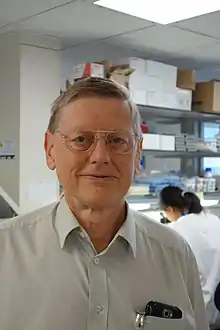Stephen R. Bloom
Sir Stephen Robert Bloom FRS[3] (born 24 October 1942) is a British Professor of Medicine at Imperial College London where he leads the Diabetes, Endocrinology and Metabolism division.[4][5][6][7][8]
Sir Stephen Bloom | |
|---|---|
 | |
| Born | Stephen Robert Bloom 24 October 1942[1] |
| Alma mater | University of Cambridge (MA, MD) |
| Spouse(s) | Margaret Janet Bloom (née Sturrock)
(m. 1965) |
| Children | four[1] |
| Awards | |
| Scientific career | |
| Institutions | |
Education
Bloom was educated at Queens' College, Cambridge where he was awarded a Master of Arts degree in 1968 and a Doctor of Medicine degree in 1979.[1] He received his Doctor of Science (DSc) degree from the University of London in 1982. Bloom completed appointments as a house officer, senior house officer and specialist registrar at Middlesex Hospital, University College London, where he also received his Medical Research Council (MRC) Clinical Research Fellowship training.
Awards and honours
Bloom was elected a Fellow of the Royal Society (FRS) in 2013. His nomination reads:
Bloom played a seminal role in establishing the biology and pathophysiology of the intrinsic endocrine system of the gastrointestinal tract, an area which he pioneered and which is now a major focus of basic and applied laboratories worldwide. Through the identification of clinical syndromes associated with overproduction of these hormones and experimental physiological studies in man, Bloom established the physiological effects of these hormones. Importantly, he recognised that several gut derived peptides powerfully influenced glucose homeostasis and/or appetite, insights which have led to major developments in the treatment of Type 2 diabetes and obesity.[3]
Blooms research has been funded by grants awarded by the BBSRC and Medical Research Council (MRC).[9]
Bloom was also knighted in the Queen's 2012 New Year Honours, and awarded Fellowships of the Royal College of Physicians (FRCP), Royal College of Pathologists (FRCPath), the Academy of Medical Sciences (FMedSci) and the Royal Society of Biology (FRSB). Bloom is Chairman of a Biotechnology Company, Zihipp, which completed round A funding in January 2020. It specialises in peptide hormone analogues to treat obesity and diabetes.
References
- "BLOOM, Prof. Sir Stephen (Robert)". Who's Who. ukwhoswho.com. 2015 (online Oxford University Press ed.). A & C Black, an imprint of Bloomsbury Publishing plc. (subscription or UK public library membership required) (subscription required)
- "BLOOM, Margaret Janet, (Lady Bloom)". Who's Who. ukwhoswho.com. 2015 (online Oxford University Press ed.). A & C Black, an imprint of Bloomsbury Publishing plc. (subscription or UK public library membership required) (subscription required)
- "Professor Stephen Bloom FRS". London: The Royal Society. Archived from the original on 11 August 2014.
- Stephen R. Bloom's publications indexed by the Scopus bibliographic database. (subscription required)
- Batterham, R. L.; Cowley, M. A.; Small, C. J.; Herzog, H.; Cohen, M. A.; Dakin, C. L.; Wren, A. M.; Brynes, A. E.; Low, M. J.; Ghatei, M. A.; Cone, R. D.; Bloom, S. R. (2002). "Gut hormone PYY3-36 physiologically inhibits food intake". Nature. 418 (6898): 650–4. doi:10.1038/nature00887. PMID 12167864.
- Lechler, R. I.; Lord, G. M.; Matarese, G.; Howard, J. K.; Baker, R. J.; Bloom, S. R. (1998). "Leptin modulates the T-cell immune response and reverses starvation-induced immunosuppression". Nature. 394 (6696): 897–901. doi:10.1038/29795. PMID 9732873.
- Batterham, R. L.; Cohen, M. A.; Ellis, S. M.; Le Roux, C. W.; Withers, D. J.; Frost, G. S.; Ghatei, M. A.; Bloom, S. R. (2003). "Inhibition of food intake in obese subjects by peptide YY3-36" (PDF). New England Journal of Medicine. 349 (10): 941–8. doi:10.1056/NEJMoa030204. PMID 12954742.
- "Professor Sir Stephen Bloom, FRS". Imperial College London. Archived from the original on 18 November 2014.
- "UK Government Grants awarded to Stephen R. Bloom". Research Councils UK. Archived from the original on 8 June 2015.